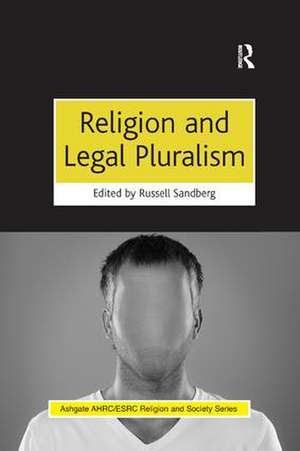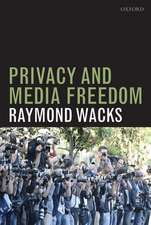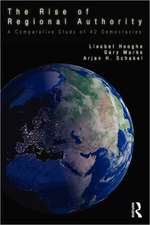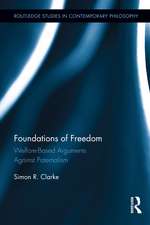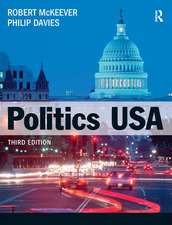Religion and Legal Pluralism: AHRC/ESRC Religion and Society Series
Editat de Russell Sandbergen Limba Engleză Paperback – 31 mar 2017
| Toate formatele și edițiile | Preț | Express |
|---|---|---|
| Paperback (1) | 456.06 lei 43-57 zile | |
| Taylor & Francis – 31 mar 2017 | 456.06 lei 43-57 zile | |
| Hardback (1) | 1009.74 lei 43-57 zile | |
| Taylor & Francis – 28 iun 2015 | 1009.74 lei 43-57 zile |
Preț: 456.06 lei
Nou
Puncte Express: 684
Preț estimativ în valută:
87.27€ • 91.34$ • 72.63£
87.27€ • 91.34$ • 72.63£
Carte tipărită la comandă
Livrare economică 31 martie-14 aprilie
Preluare comenzi: 021 569.72.76
Specificații
ISBN-13: 9781138053298
ISBN-10: 1138053295
Pagini: 300
Dimensiuni: 156 x 234 x 16 mm
Greutate: 0.45 kg
Ediția:1
Editura: Taylor & Francis
Colecția Routledge
Seria AHRC/ESRC Religion and Society Series
Locul publicării:Oxford, United Kingdom
ISBN-10: 1138053295
Pagini: 300
Dimensiuni: 156 x 234 x 16 mm
Greutate: 0.45 kg
Ediția:1
Editura: Taylor & Francis
Colecția Routledge
Seria AHRC/ESRC Religion and Society Series
Locul publicării:Oxford, United Kingdom
Cuprins
Contents: Preface; The impossible compromise, Russell Sandberg. Part I In Practice: Religion and the state: recognition, regulation and facilitation, Mark Hill QC; Turbulent priests: how the Church of England disciplines its errant clergy, Christopher Smith; Who regulates marriage? The case of religious marriage and divorce, Gillian Douglas; Quakers and the campaign for same sex marriage, Frank Cranmer; The use of experts in the Roman Catholic canon law of marriage, Eithne D’Auria; Religious symbols and the making of contemporary religious identities, Sylvie Bacquet. Part II Particular Issues: Quasi-law and religion, David Pocklington; Legal pluralism, religious conservatism, Amina Hussain; Internet-based new religious movements and dispute resolution, Beth Singler; Religious pluralism as a legal principle, Dorota A. Gozdecka. Part III In Theory: What do you believe? Taxonomy of a subjective legal pluralism, Amy R. Codling; Public space, private face: veiling as a challenge for legal reasoning, Celia G. Kenny; Principles of a pluralist secularism, Margaret Davies; Religious law as a social system, Russell Sandberg. Appendix, Russell Sandberg and Frank Cranmer. Index.
Notă biografică
Russell Sandberg is a Senior Lecturer in Law at Cardiff University where he researches at the Centre for Law and Religion. His publications include Law and Religion and Religion, Law and Society.
Recenzii
"Religious and legal pluralism is a fact of life in contemporary Britain. This collection of essays is an important contribution to debate about the consequences of this.’ Anthony Bradney, Keele University, UK ’Legal pluralism is frequently seen as the best tool to face the challenge raised by increasing religious diversity. The assets and risks of this strategy are carefully and competently assessed in this book through an intelligent mix of theoretical contributions and case-studies."
- Silvio Ferrari, University of Milan, Italy
"Religion and Legal Pluralism is a major contribution to our understanding of legal pluralism in general and its specific relevance to questions of religious regulation and exemptions from legal oversight."
- Bryan S. Turner, Australian Catholic University in Journal of Church and State, 2017
- Silvio Ferrari, University of Milan, Italy
"Religion and Legal Pluralism is a major contribution to our understanding of legal pluralism in general and its specific relevance to questions of religious regulation and exemptions from legal oversight."
- Bryan S. Turner, Australian Catholic University in Journal of Church and State, 2017
Descriere
Whilst a number of important theoretical works concerning legal pluralism in the context of cultural rights have been published, little has been published specifically on religion. Religion and Legal Pluralism explores the extent to which religious laws are already recognised by the state and the extent to which religious legal systems, such as Sharia law, should be accommodated.
